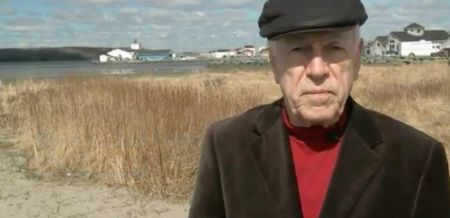The premiere of Salmon Wars last night demonstrated a film that will no doubt become a powerful resource in the growing movement against salmon aquaculture in Nova Scotia.
The 70-minute documentary acts as a cliff notes version of the salmon farming industry in the Maritimes, and across the world, addressing innumerable environmental, economic, social and political concerns.
“I hope it came across as being a piece with a definite point of view, but is not unfair to other points of view,” says Salmon Wars writer and host Silver Donald Cameron.
Sure enough, the film presents a wonderful juxtaposition of talking heads: bureaucrats versus fishermen; industry representatives versus scientists.
Breaking up these opposing views is Cameron’s rapid-fire delivery of facts speckled with a somehow charming-yet-biting serving of his own opinions and eloquent analogies. “Grappling, reckless, sly and sometimes criminal,” he describes the salmon aquaculture industry at one point in the film.
Cameron also took a hard stance on the provincial NDP government. He says he set out to produce an environmental documentary but invariably his research took a turn toward the political: “If your talking about off-shore drilling; if you’re talking about fracking; if you’re talking about clear cutting; if you’re talking about any of these issues, they’re all governed by big business and by money, particularly in the States but increasingly here too. That’s where the decisions really are: it’s the influence of money on government regulating what businesses are going to do.”
Cameron’s words would have fallen flat without the equally powerful images of filmmaker and director Chris Beckett. If the verbalized facts aren’t convincing enough, the skin-crawling footage of sea lice-infected salmon, cramped net-pens, and filthy harbour beds should do the trick.
The movie wasn’t all negativity, however. Cameron balanced his criticism with an analysis of alternatives to open net-pen salmon aquaculture, such as closed tanks in water and on land. He also argued that the province might want to consider moving away from the salmon industry altogether in pursuit of bigger (or smaller) fish, and that the informed consumer is likely the most powerful agent against the status quo of salmon farming.
Easier proposed than done. The sighs from the audience indicated the collective frustration over this issue. The premiere attracted over 200 people of all ages to Halifax Citadel High School’s Spatz Theatre where a panel-led Q&A period followed the screening. The event was also live streamed to audiences in Jordan Bay, Freeport, Port Mouton and Wolfville.
The film is the product of what Cameron calls the “Ofias Odyssey” — that stands for Old Farts In A Subaru. Cameron and Beckett travelled around Canada and the United collecting the footage seen in Salmon Wars, and they did it on a slim budget. Fifty thousand dollars donated by local groups and individuals allowed the pair to capture over 40 hours of footage and interviews. “People were very happy to see us because somebody was finally paying attention to something they’d known for a long time,” says Beckett.
Despite the range of issues covered in the film, Cameron is disappointed that certain concerns surrounding the salmon industry had to be cut for either budget or time reasons. “I’m startled by the revelation that Cooke [Aquaculture] brings in people from Romania and the Philippines to work in their plants, and we weren’t able to pursue that very far,” he offers as one example. The Nova Scotia company refused to appear in the film.
He also says he wished he could have included information about the noise open net-pen salmon farms produce, and address how tracing lobster back to their fishing grounds close to these farms could harm Nova Scotia’s selling point of pristine seafood on the consumer market. Finally, Cameron says: “For me, the major unanswered question in the film is why this government is so committed to such a questionable industry.”
It’s a conundrum Cameron is unlikely to solve soon. He says he’s eager to get back to The Green Interview, his primary professional project, and can’t see himself spending much more time on the issue of salmon aquaculture in the future.
But the Salmon Wars’ life is just beginning. Cameron says at least four more Nova Scotia screenings are in the works. The film may also be marketed to cable or network television and could be entered into festivals. For those wanting to watch from home, the film is now available for free download on the Salmon Wars website.



